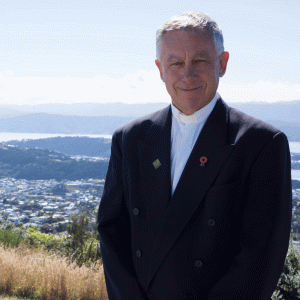WelCom March 2019:
“People of God as Missionary Disciples”

Cardinal John Dew, Archbishop of Wellington
I recently sent the archdiocesan Pastoral Teams and leadership groups a document that contains a directive. I explained the directive in a pastoral letter, which I asked to be read in parishes on the weekend of 16–17 February.
I very rarely direct parishes to take a certain action, so this indicates the seriousness of what I am asking of you.
Between 2013 to 2017 the Archdiocese carried out a parish amalgamation process, which resulted in the reduction of the number of parishes from 47 to 22. This means, there are now parishes that have two or more churches, more than is necessary for worship and pastoral care. In some places the integration of church communities has been slow.
In addition, the Archdiocese continues to experience pressures that compound the present situation and carry major implications for the future.
- Earthquake resilience issues—mean we have unsustainable insurance costs and buildings with unacceptable NBS ratings.
- The reduced number of priests, which is accelerating each year—means in most parishes there is a single priest (often elderly) expected to minister in more than one church.
- Availability and ability of priests—are highly significant factors governing decisions for our future that cannot be delayed.
“If we are to respond well to present and future challenges, we need to act together in favour of the common good of all parishes and support one another in a process of change.”
The 2017 Archdiocesan Synod voted for new priorities that must be addressed. They cannot be simply ‘add-ons’ to what we already do. They require us to look with new eyes and, with Pope Francis, to radically rethink how we are to be ‘the People of God’ in today’s environment.
We are called to be ‘missionary disciples’, which in the words of Pope Francis, makes an attitude of ‘we’ve always done it this way’ not only damaging to the Church, but invalid.
Here is our situation
- We have too many churches and presbyteries for our Mass count, and for the number and age of our priests.
- Some of the churches require large sums of money to address their earthquake resilience and general maintenance.
- Pope Francis and the Synod have challenged us to be more outward-looking and to serve those who are marginalised or disadvantaged.
If we are to respond well to present and future challenges, we need to act together in favour of the common good of all parishes, and support one another in a process of change. This is not an easy task for any of us.
Some of you may see this as a threat to the status quo, but I would like you to see our situation as an opportunity to let the Holy Spirit work in our midst to create a sustainable and mission-oriented future.
I have directed every parish to carry out a review of its churches and presbyteries, including parishes with only a single church. The review is to be with me, complete with developed proposals, by
30 October 2019.
The review will identify how many churches the parish needs to cater for its Mass count – taking into account the availability of priests and lay pastoral leaders – and the ideal location of the church or churches. For most if not all parishes with more than one church, this will mean reducing the number of churches in the parish.
Provision for accommodation of priests is part of the review.
The review involves collecting and analysing information, and consultation among parishioners, which is very important. It should result in proposals that are both realistic and practical. You need to be prepared to be radical in your thinking and discernment.
The theme of parish amalgamation was ‘A Future Full of Hope’. This hope-filled future will only start to take shape when we honestly and courageously engage with and answer the many questions about our buildings, and how we can truly be ‘missionary disciples’.